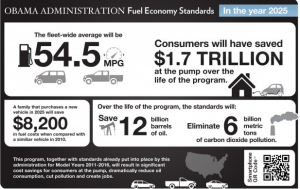The U.S. government may not be able to figure out how to save our country from it’s multi-trillion dollar debt, but for the second time during his administration, President Obama has increased CAFE standards or the Corporate Average Fuel Economy standards. The goal for all new cars and light duty trucks manufactured in 2025 and beyond must be at least 54.5 miles per gallon (54.5 MPG) up from the increase to 35.5 mpg goal set for 2016 that was announced in 2009. This marks the largest mandatory increase in fuel economy in the history of the country; however it is short of the original goal of 62 mpg.
 During a press announcement, President Obama cited this action would save consumers money at the pump – $1.7 trillion dollars in real fuel costs over the life of the vehicle and save families an estimated $8,200 in fuel savings over the lifetime of the vehicle, relative to the Model Year 2010 standard.
During a press announcement, President Obama cited this action would save consumers money at the pump – $1.7 trillion dollars in real fuel costs over the life of the vehicle and save families an estimated $8,200 in fuel savings over the lifetime of the vehicle, relative to the Model Year 2010 standard.
The movement to better fuel economy has been caused by many factors but concerns about prices at the pump, a dwindling supply of oil and climate change have all played major roles in causing auto manufacturers to finally spend some R&D in producing cars with better fuel mileage. The leading sector in improved mileage has been electric vehicles and hybrids, a combination of an electric vehicle with a gasoline engine (and some are flex-fuel vehicles meaning they can use up to 85 percent ethanol).
So what do consumers think about this move and who do they think will get their first? In a recent poll commissioned by LeaseTrader.com, 63.6 percent of respondents believe Hyundai is best positioned to meet these standards, even before 2025. During the week of July 18-22, 1,138 drivers from across the U.S. responded. Seventy two point four percent of the respondents are in favor of the higher fuel standards, but only 34.5 percent remain supportive if it means vehicle prices will rise more than $2,000.
Other results show that 63.3 percent of those polled believe the automakers already have the technology to significantly improve fuel standard technology and 47.2 percent believe domestic carmakers can be profitable under these fuel standards.

